- Python Basic Programs
- Python Program Examples
- Python Print Hello World
- Python Get Input from User
- Python Add Two Numbers
- Add Subtract Multiply Divide
- Python Check Even or Odd
- Python Check Prime or Not
- Python Check Alphabet or Not
- Python Check Vowel or Not
- Python Check Leap Year or Not
- Check Reverse equal Original
- Check Positive Negative Zero
- Python Check Armstrong or Not
- Python Check Palindrome or Not
- Python Check Perfect Number
- Python Find Reverse of Number
- Python Count Digits in Number
- Python Add Digits of Number
- Sum of First and Last Digits
- Python Product of Mid Digits
- Sum of Squares of Digits
- Interchange Digits of Number
- Python Sum of n Numbers
- Python Print ASCII Values
- Python Swap Two Numbers
- Python Swap Two Variables
- Python Fahrenheit to Celsius
- Python Celsius to Fahrenheit
- Python Display Calendar
- Python Days into Years, Weeks
- Find Largest of Two Number
- Find Largest of Three Number
- Python Print Fibonacci Series
- Generate Armstrong Numbers
- Python Make Simple Calculator
- Python Add Binary Numbers
- Binary Number Multiplication
- Python Mathematical Programs
- Find Sum of Natural Numbers
- Find Average of n Numbers
- Python Print Multiplication Table
- Print Table using Recursion
- Python Find Average Percentage
- Python Find Grade of Student
- Find Square Root of Number
- Python Print Prime Numbers
- Find Numbers Divisible by
- Python Find Factors of Number
- Python Find Factorial of a Number
- Python Find HCF & LCM
- Python Kilometres to Miles
- Python Find Area of Square
- Python Find Area of Rectangle
- Python Find Area of Triangle
- Python Find Area of Circle
- Python Find Perimeter of Square
- Find Perimeter of Rectangle
- Python Find Perimeter of Triangle
- Find Circumference of Circle
- Python Simple Interest
- Python Solve Quadratic Equation
- Python Different Set of Operations
- Python Display Powers of 2
- Python Find nCr & nPr
- Python Pattern Programs
- Python Print Pattern Programs
- Python Print Diamond Pattern
- Python Print Floyd's Triangle
- Python Print Pascal's Triangle
- Python List Programs
- Python Count Even/Odd in List
- Python Positive/Negative in List
- Python Even Numbers in List
- Python Odd Numbers in List
- Python Sum of Elements in List
- Sum of Odd/Even Numbers
- Python Element at Even Position
- Python Element at Odd Position
- Python Search Element in List
- Python Largest Number in List
- Python Smallest Number in List
- Python Second Largest in List
- Python Second Smallest in List
- Python Insert Element in List
- Python Delete Element from List
- Python Multiply Numbers in List
- Swap Two Elements in List
- Python 1D Array Program
- Python Linear Search
- Python Binary Search
- Python Insertion Sort
- Python Bubble Sort
- Python Selection Sort
- Remove Duplicates from List
- Python Reverse a List
- Python Merge Two List
- Python Copy a List
- Python Conversion Programs
- Python Decimal to Binary
- Python Decimal to Octal
- Python Decimal to Hexadecimal
- Python Binary to Decimal
- Python Binary to Octal
- Python Binary to Hexadecimal
- Python Octal to Decimal
- Python Octal to Binary
- Python Octal to Hexadecimal
- Python Hexadecimal to Decimal
- Python Hexadecimal to Binary
- Python Hexadecimal to Octal
- Python Matrix Programs
- Python Add Two Matrices
- Python Subtract Two Matrices
- Python Transpose Matrix
- Python Multiply Matrices
- Python String Programs
- Python Print String
- Python Find Length of String
- Python Compare Two Strings
- Python Copy String
- Python Concatenate String
- Python Reverse a String
- Python Swap Two Strings
- Python Uppercase to Lowercase
- Python Lowercase to Uppercase
- Python Check Substring in String
- Python Count Character in String
- Count Repeated Characters
- Python Count Word in Sentence
- Python Count Each Vowels
- Python Capitalize Character
- Python Capitalize Word in String
- Python Smallest/Largest Word
- Remove Spaces from String
- Remove Duplicate Character
- Remove Vowels from String
- Remove Punctuation from String
- Python Remove Word in String
- Python Remove Duplicate Words
- WhiteSpace to Hyphens
- Replace Vowels with Character
- Replace Character in String
- Python Sort String in Alphabetical
- Sort Word in Alphabetical Order
- Extract Number from String
- Python Check Anagram Strings
- Python File Programs
- Python Read a File
- Python Write to File
- Python Append Text to File
- Python Copy Files
- Python Merge Two Files
- Python Counts Characters in File
- Python Count Words in File
- Python File Content in Reverse
- Python Lines Contains String
- Python Delete Line from File
- Python Capitalize Word in File
- Python Replace Text in File
- Replace Specific Line in File
- Python Find Size of File
- Python List Files in Directory
- Python Delete Files
- Python Misc Programs
- Python Reverse a Tuple
- Python Merge Two Dictionary
- Python bytes to String
- Python bytearray to String
- Generate Random Numbers
- Python Print Address of Variable
- Python Print Date and Time
- Python Get IP Address
- Python Shutdown/Restart PC
- Python Tutorial
- Python Tutorial
Python Program to List Files in Directory
This article is created to cover some programs in Python, that list and prints files from directory. Here are the list of programs available in this article:
- List and print all files in a current directory
- List files with only particular extension from current directory
- List files from any directory provided by user
List and Print all Files in Current Directory
To list all files present in current directory, we've to use glob() method. This method is defined in glob module, therefore before using it, it must be imported. So that, we can call the glob() method defined in that module using module name followed by dot (.) operator and then method name, that is glob.glob()
The current directory means the directory where the source code of Python program is saved.
The argument of glob.glob() defines what type of file to list. That is, if user provides *.*, then it indicates to list all files. The * indicates to all type, that is the star (*) before dot (.) indicates to fetch all files and the star (*) after dot (.) indicates to fetch all extension.
Now let's create the program to do the task. But before going through program, here is the snapshot of the current directory folder, in my case, that contains three files:
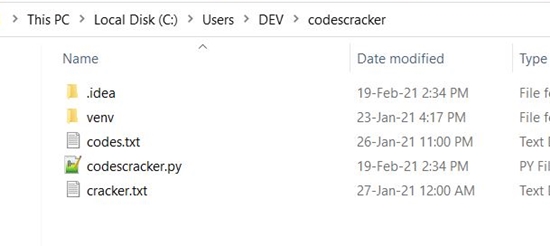
Now let's create the Python program to list and print all these files through program:
import glob print("List of All Files in Current Directory:") for file in glob.glob("*.*"): print(file)
This program produces the output like shown in the snapshot given below. Whatever (files) stored in your current directory (the directory where this program is saved) gets listed and printed on output:
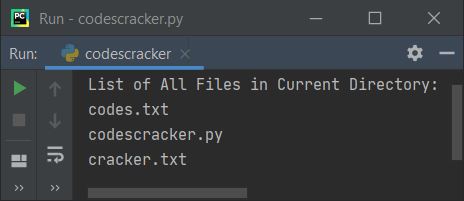
Note - Now if you create or add another file say fresherearth.html inside the same directory. Here is the snapshot of the current directory folder after creating another file:
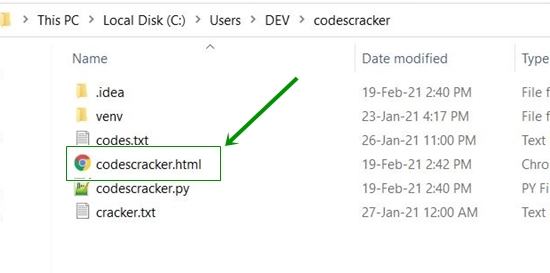
Now if you re-run the above program, then this time, the output includes a new file name, that is fresherearth.html as its output like shown in the snapshot given below:
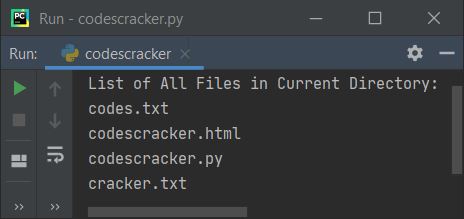
List Files in Directory with Extension
To list and print files having particular extension say .html, then replace the second star (*) with html. Or to list only textual files (all files with .txt extension), replace *.* with *.txt. Here is the complete program to list files with only particular extension (.html):
import glob print("List of All Files with \".html\" Extension:") for file in glob.glob("*.html"): print(file)
Here is its sample output:

There is only one file available in the current directory with .html extension.
List Files with Extension Provided by User
This is the modified version of previous program. This program receives input from user as extension to list required extension's files. Enter .* to list all files without mattering about extension:
import glob print("Enter the Extension (eg, .txt, .html, .css etc): ", end="") e = input() fileslist = [] for file in glob.glob("*"+e): fileslist.append(file) if len(fileslist)>0: print("\nList of All Files with \"" +e+ "\" Extension:") for f in fileslist: print(f) else: print("\nNot found with \"" +e+ "\" extension!")
Here is its sample run. This is the initial output:

Now supply the input say .txt as extension to list and print all files having .txt extension like shown in the snapshot given below:
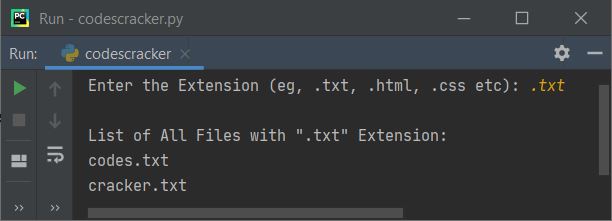
And here is another sample run with user input .css (no file available with this extension, in current directory):

List and See Files from any Directory by User
Now let's modify the above program and allow user to enter their own required directory to list all the files from it. The chdir() (change directory) is used to change the directory. That is, whatever the directory is provided as its argument. The current working directory gets changed to that directory. This method is defined in os module.
import glob, os print("Enter Full Path of a Folder: ", end="") path = input() os.chdir(path) print("\n1. List all Files ?") print("2. List all Files with Particular Extension ?") print("Enter Your Choice (1 or 2): ", end="") try: ch = int(input()) if ch==1: print("\nList of All Files:") for file in glob.glob("*.*"): print(file) elif ch==2: print("\nEnter the Extension (eg, .txt, .html, .css etc): ", end="") e = input() fileslist = [] for file in glob.glob("*" + e): fileslist.append(file) if len(fileslist) > 0: print("\nList of All Files with \"" + e + "\" Extension:") for f in fileslist: print(f) else: print("\nNot found with \"" + e + "\" extension!") else: print("\nInvalid Choice!") except ValueError: print("\nInvalid Input!")
I'm going to operate with a directory, where the folder named Scripts contains these files:
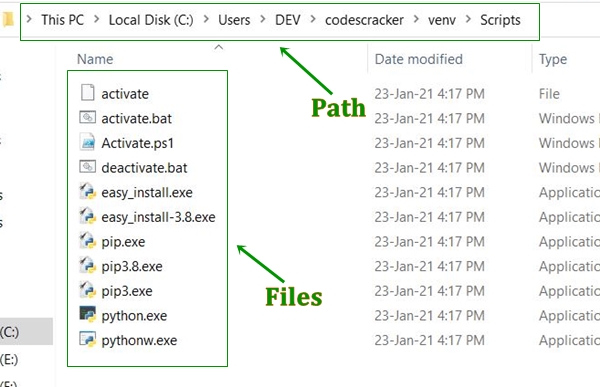
Copy the full path of this folder (or any folder you want), then execute the above program and just paste the path as first input asked by the program like shown in the snapshot given below:

Now paste the folder's path say C:\Users\DEV\fresherearth\venv\Scripts in my case, then entered the choice as 2, and then .exe as extension to list all files from that directory with .exe extension. Here is the complete sample run:
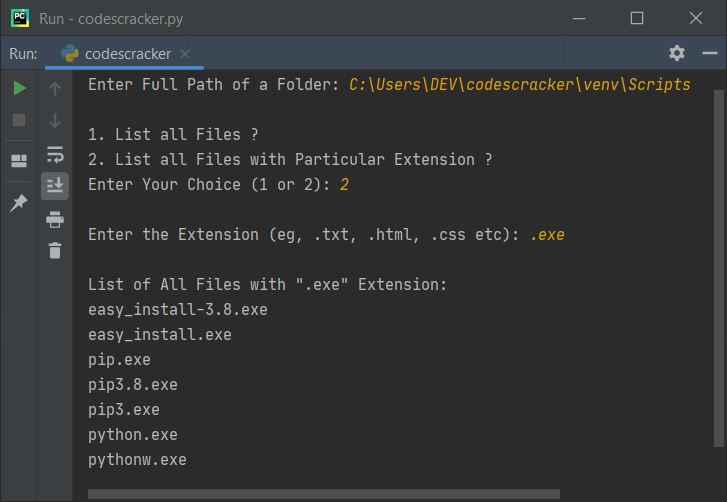
Same Program in Other Languages
« Previous Program Next Program »